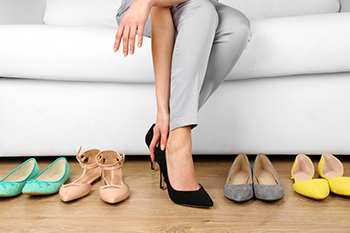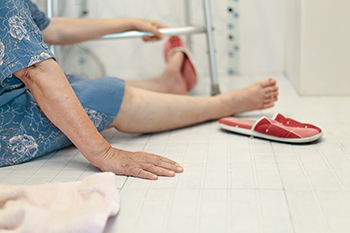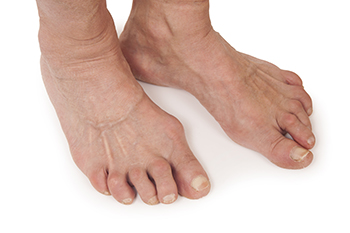

Nighttime foot cramps are a common and disruptive issue, affecting up to 60 percent of adults. They can be caused by inactivity, poor posture, and sleeping positions that restrict blood flow and compress nerves. Overexerting foot muscles through excessive activity or fatigue can lead to muscle cramping, as can wearing improper footwear or working on hard surfaces. Dehydration, often from inadequate water intake or illness, can result in foot muscle cramps due to electrolyte imbalances. Nutrient deficiencies, particularly in vitamins B-12, thiamin, folate, magnesium, and potassium, can lead to nerve damage and cause cramps. Excessive alcohol use may cause nerve damage and alcoholic neuropathy that may contribute to foot cramps. Pregnancy, especially in the later stages, can bring on leg and foot cramps, possibly due to increased weight and nutritional deficiencies. Certain health conditions like peripheral arterial disease, kidney disease, anemia, and diabetes can also be associated with nighttime foot cramps. If your foot cramps occur frequently and do not improve even after making adjustments to your routine, it is suggested that you make an appointment with a podiatrist. This specialist in foot and ankle care can perform a thorough evaluation, provide you with a proper diagnosis, and recommend treatment options to alleviate your discomfort.
Foot Pain
Foot pain can be extremely painful and debilitating. If you have a foot pain, consult with Dr. Stephan J. LaPointe from Georgia Foot & Ankle Specialists . Our doctor will assess your condition and provide you with quality foot and ankle treatment.
Causes
Foot pain is a very broad condition that could be caused by one or more ailments. The most common include:
Diagnosis
To figure out the cause of foot pain, podiatrists utilize several different methods. This can range from simple visual inspections and sensation tests to X-rays and MRI scans. Prior medical history, family medical history, and any recent physical traumatic events will all be taken into consideration for a proper diagnosis.
Treatment
Treatment depends upon the cause of the foot pain. Whether it is resting, staying off the foot, or having surgery; podiatrists have a number of treatment options available for foot pain.
If you have any questions, please feel free to contact our office located in Rome, GA . We offer the newest diagnostic and treatment technologies for all your foot care needs.

Our feet bear the brunt of our daily activities, making everyday foot care an essential part of maintaining overall well-being. There are several practical tips to ensure your feet stay healthy and pain-free. These can begin with washing your feet daily, ensuring to dry thoroughly, especially between the toes. Keeping your toenails trimmed straight across and not too short may help to prevent ingrown toenails. Choose comfortable, well-fitting shoes that provide proper arch support and cushioning. Additionally, it is beneficial to alternate your shoes to give them time to air out, reducing the risk of foot odor and fungal infections. Regularly moisturize your feet to prevent dry, cracked skin. Performing regular foot stretches and massages can help improve circulation and relieve tension. Be mindful of foot pain or discomfort, as early intervention can prevent more significant issues. Lastly, maintaining a healthy weight and staying active can reduce the strain on your feet. If you would like to have more information about everyday foot care tips, it is suggested that you confer with a podiatrist.
Everyday foot care is very important to prevent infection and other foot ailments. If you need your feet checked, contact Dr. Stephan J. LaPointe from Georgia Foot & Ankle Specialists . Our doctor can provide the care you need to keep you pain-free and on your feet.
Everyday Foot Care
Often, people take care of their bodies, face and hair more so than they do for their feet. But the feet are a very important aspect of our bodies, and one that we should pay more attention to. Without our feet, we would not be able to perform most daily tasks.
It is best to check your feet regularly to make sure there are no new bruises or cuts that you may not have noticed before. For dry feet, moisturizer can easily be a remedy and can be applied as often as necessary to the affected areas. Wearing shoes that fit well can also help you maintain good foot health, as well as making it easier to walk and do daily activities without the stress or pain of ill-fitting shoes, high heels, or even flip flops. Wearing clean socks with closed shoes is important to ensure that sweat and bacteria do not accumulate within the shoe. Clean socks help to prevent Athlete’s foot, fungi problems, bad odors, and can absorb sweat.
If you have any questions please feel free to contact our office located in Rome, GA . We offer the newest diagnostic and treatment technologies for all your foot and ankle needs.

High heels are a popular fashion choice, often adding a stylish touch to special occasions. However, one should be aware of the potential negative effects on foot health when worn regularly. High heels can lead to various foot problems, including bunions, blisters, corns, and calluses. One common side effect is lower back pain, as these shoes lack adequate foot support, causing an uneven weight distribution. Foot pain is prevalent due to circulation problems and metatarsalgia. Ankle sprains, broken ankles, and awkward spinal curvature may result from wearing high heels, especially on uneven surfaces. Furthermore, high heels can constrict blood vessels and hinder natural blood flow, potentially leading to varicose veins and deformities such as hammertoe. They can also weaken ligaments and increase pressure on the knee joint, possibly causing osteoarthritis. If you enjoy wearing high heels, it is suggested that you make an appointment with a podiatrist to discuss the frequency of wear and consider alternative footwear choices that may help prevent potential health issues.
High heels have a history of causing foot and ankle problems. If you have any concerns about your feet or ankles, contact Dr. Stephan J. LaPointe from Georgia Foot & Ankle Specialists . Our doctor can provide the care you need to keep you pain-free and on your feet.
Effects of High Heels on the Feet
High heels are popular shoes among women because of their many styles and societal appeal. Despite this, high heels can still cause many health problems if worn too frequently.
Which Parts of My Body Will Be Affected by High Heels?
What Kinds of Foot Problems Can Develop from Wearing High Heels?
How Can I Still Wear High Heels and Maintain Foot Health?
If you want to wear high heeled shoes, make sure that you are not wearing them every day, as this will help prevent long term physical problems. Try wearing thicker heels as opposed to stilettos to distribute weight more evenly across the feet. Always make sure you are wearing the proper shoes for the right occasion, such as sneakers for exercising. If you walk to work, try carrying your heels with you and changing into them once you arrive at work. Adding inserts to your heels can help cushion your feet and absorb shock. Full foot inserts or metatarsal pads are available.
If you have any questions please feel free to contact our office located in Rome, GA . We offer the newest diagnostic and treatment technologies for all your foot and ankle needs.

As you age, ensuring your home is safe becomes increasingly important to prevent falls and injuries. Fall proofing your living space can significantly reduce the risk of accidents. This can begin by decluttering walkways and removing any potential tripping hazards, such as loose rugs or cords. Installing grab bars in bathrooms and railings on stairs can help to provide support. Adequate lighting throughout your home is essential, and well lit areas can help you see potential obstacles more clearly. Keep frequently used items within easy reach to prevent unnecessary stretching or bending. Consider non-slip mats in the bathroom and kitchen to avoid slipping on wet surfaces. Regularly inspect and maintain the condition of your floors, ensuring they are even and free of loose tiles or floorboards. If you would like to learn about how fall prevention techniques can protect the feet, it is suggested that you consult a podiatrist.
Preventing falls among the elderly is very important. If you are older and have fallen or fear that you are prone to falling, consult with Dr. Stephan J. LaPointe from Georgia Foot & Ankle Specialists . Our doctor will assess your condition and provide you with quality advice and care.
Every 11 seconds, an elderly American is being treated in an emergency room for a fall related injury. Falls are the leading cause of head and hip injuries for those 65 and older. Due to decreases in strength, balance, senses, and lack of awareness, elderly persons are very susceptible to falling. Thankfully, there are a number of things older persons can do to prevent falls.
How to Prevent Falls
Some effective methods that older persons can do to prevent falls include:
Falling can be a traumatic and embarrassing experience for elderly persons; this can make them less willing to leave the house, and less willing to talk to someone about their fears of falling. Doing such things, however, will increase the likelihood of tripping or losing one’s balance. Knowing the causes of falling and how to prevent them is the best way to mitigate the risk of serious injury.
If you have any questions, please feel free to contact our office located in Rome, GA . We offer the newest diagnostic and treatment technologies for all your foot care needs.

Arthritis is a common condition that affects millions of people worldwide, and it can manifest in various parts of the body, including the feet and ankles. If you have been experiencing persistent discomfort or pain in your lower extremities, it is essential to understand the signs and symptoms of arthritis in the feet and ankles, and to seek timely treatment. One of the earliest symptoms is pain, often accompanied by stiffness in the affected joints. Arthritis can make simple activities such as walking or climbing stairs painful. Inflammation is common in patients who have arthritis, leading to noticeable swelling and redness around the affected joints, especially after prolonged periods of activity. Arthritis can also cause decreased flexibility and range of motion in the feet and ankles, making it difficult to move them as freely as before. In some cases, chronic arthritis can result in joint deformities, such as bunions or hammer toes. As arthritis progresses, it can significantly affect your ability to walk comfortably and may lead to limping. If you are experiencing any of these symptoms, it is suggested that you make an appointment with a podiatrist for a proper diagnosis and tailored treatment plan.
Arthritis can be a difficult condition to live with. If you are seeking treatment, contact Dr. Stephan J. LaPointe from Georgia Foot & Ankle Specialists . Our doctor can provide the care you need to keep you pain-free and on your feet.
Arthritic Foot Care
Arthritis is a term that is commonly used to describe joint pain. The condition itself can occur to anyone of any age, race, or gender, and there are over 100 types of it. Nevertheless, arthritis is more commonly found in women compared to men, and it is also more prevalent in those who are overweight. The causes of arthritis vary depending on which type of arthritis you have. Osteoarthritis for example, is often caused by injury, while rheumatoid arthritis is caused by a misdirected immune system.
Symptoms
Arthritic symptoms range in severity, and they may come and go. Some symptoms stay the same for several years but could potentially get worse with time. Severe cases of arthritis can prevent its sufferers from performing daily activities and make walking difficult.
Risk Factors
If you suspect your arthritis is affecting your feet, it is crucial that you see a podiatrist immediately. Your doctor will be able to address your specific case and help you decide which treatment method is best for you.
If you have any questions, please feel free to contact our office located in Rome, GA . We offer the newest diagnostic and treatment technologies for all your foot care needs.